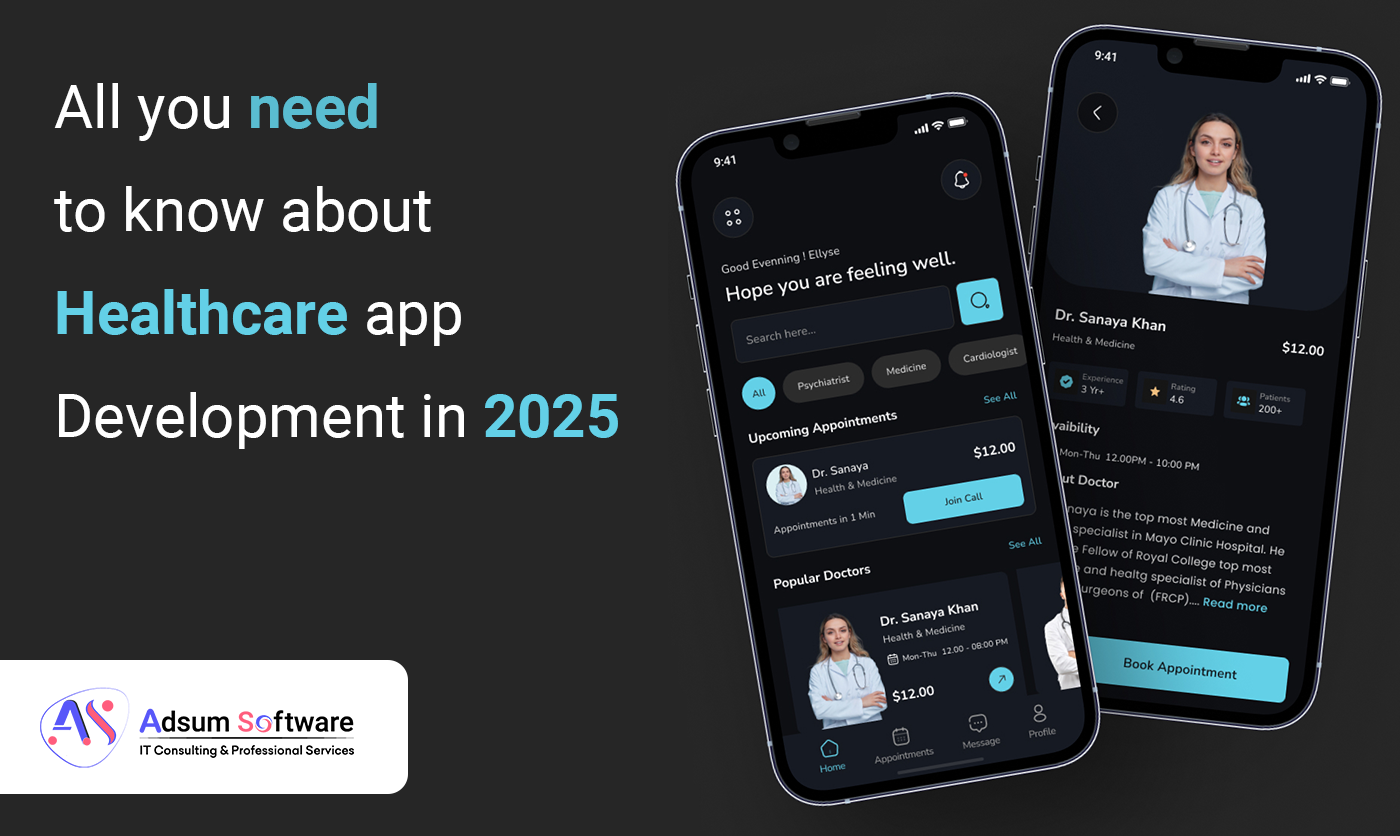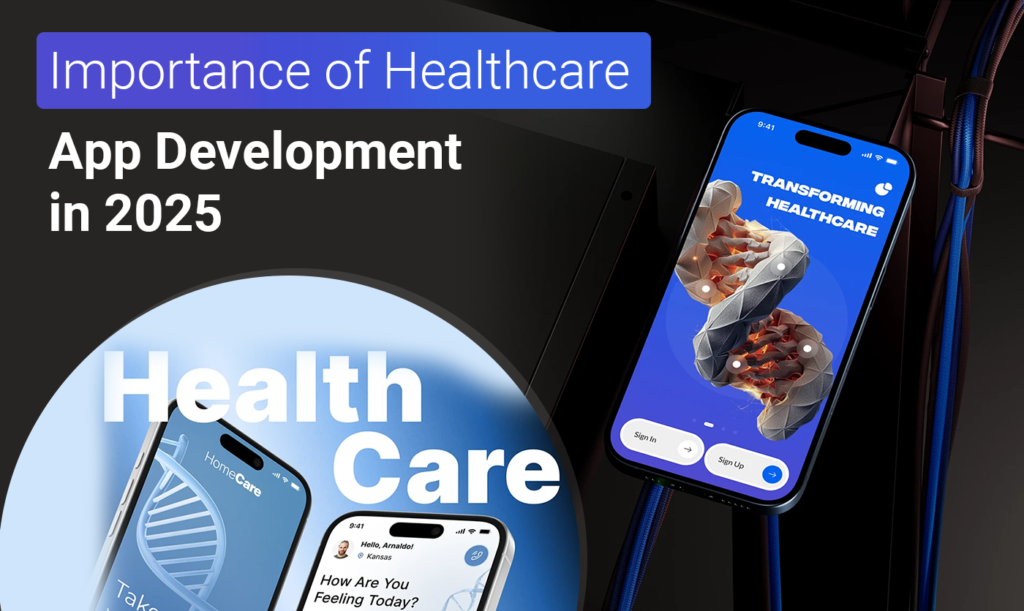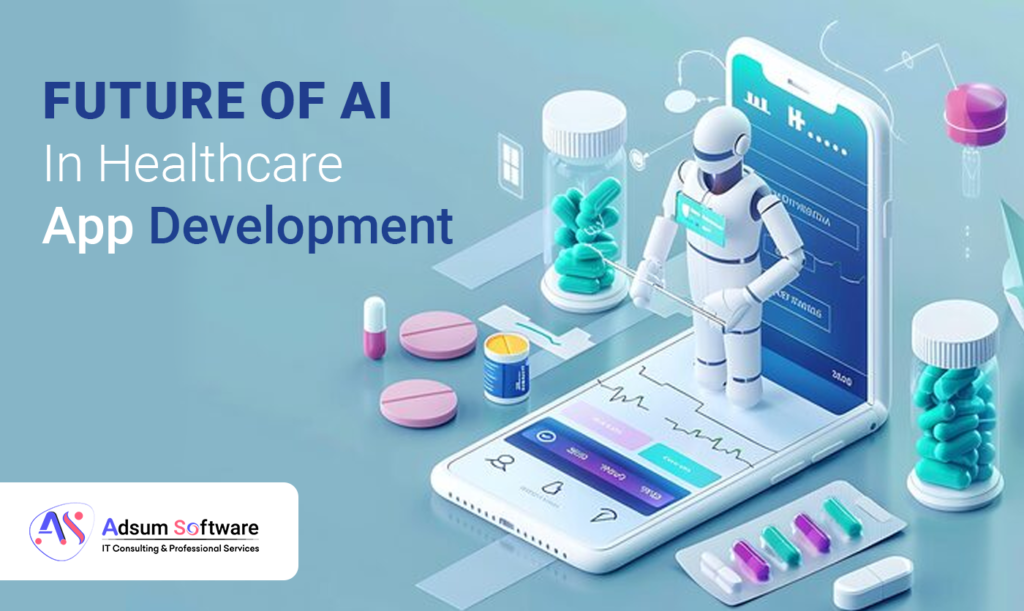Cookies help us to enhance your experience. By using the website for Adsum software, you consent to the gathering of data as set forth in our Cookie Policy.
Healthcare App Development: A Complete Guide for 2025

Can you imagine consulting with your doctor with just a few clicks, ordering medicines without leaving your house, or monitoring your blood pressure and sugar levels on your phone? We are now living with what was once considered a futuristic element. Healthcare app development has become the cornerstone of this transformation in the healthcare industry, which has rapidly adopted mobile technology.
Healthcare apps are web or mobile applications designed to deliver medical services in an accessible, efficient, and personalised manner, using plain language. In 2022, the global digital health market was worth over $330 billion. By 2025, it is expected to cross $650 billion.
Why is this change so important, then? Since it is no longer only about curing diseases but also about preventing them, healthcare concerns include prevention, access, affordability, and patient participation. All of this is made possible by apps in a manner that the old system cannot.
Table of Contents
Why Healthcare Needs Digital Transformation
Healthcare is among the most critical sectors globally and has been one of the last to adopt digital technology. For decades, patients have been confronted with issues such as:

- Protracted waiting times in hospitals.
- Shortage of specialists in rural settings.
- Paper records are easily lost.
- High-cost treatments with hidden prices.
- Communication between patients and physicians was delayed.
This is precisely why there is a need for digital transformation. A mobile-first strategy provides the solutions to all these issues:
- Enhanced Access to Care: The applications of telemedicine connect patients and doctors whenever and wherever they are.
- Better Communication: Video calls and chat are secure to keep doctors and patients in touch.
- Cost Reduction: The online consultations and e-prescriptions are more cost-effective than travelling and visiting hospitals.
- Data-Driven Decisions: Physicians will have access to real-time data about their patients, and can propose better treatments.
- Personalized Healthcare: Apps can monitor personal habits, diet, or activity and provide personalized advice.
The trend towards healthcare mobile app solutions is not merely a fad; it’s a necessity to meet contemporary patient expectations.
Key Features of a Successful Healthcare App
It’s easy to make an app. Creating a healthcare app that truly works is not always easy. Users don’t care about flashy bells and whistles — they want their apps to be secure, reliable, and easy to use. These are the features that matter:
- Easy Navigation & UI—Apps need to be accessible to all, including elderly patients who may not be tech-savvy.
- Profile Management—Both physicians and patients should each have their own dashboards.
- Appointment Booking System – Seamless calendar integration to book, reschedule, or cancel.
- Virtual Consultation Tools – Video calls, chat, and voice.
- EHR Integration—All digital medical history and reports at your fingertips.
- Prescription Upload & E-Prescriptions – Patients can scan and upload their prescriptions or get digital ones.
- Secure Payments—End-to-end encryption with multiple payment gateways.
- Notifications & Alerts—Appointment reminders, medicine intake reminders, or fitness milestones.
- AI Chatbots—To get instant answers to frequent health questions.
- Integration with Wearables—Apps that are integrated with smartwatches and IoT gadgets can monitor vital signs.
The distinction between a mediocre and an excellent app lies in its user-centric and trustworthy features.
Types of Healthcare Apps
The healthcare sector is wide, and so are the categories of apps in it. Let’s move on to the most sought-after ones:
- Telemedicine Apps
Consumers are more attracted to these apps mainly because of the lockdown, and that’s how these apps have become the default option. Doctors have video calls with patients, which in turn helps to reduce the number of face-to-face appointments that take place.
- Fitness & Lifestyle Apps
Some of these apps (e.g., pedometers and yoga instructors) take a holistic approach to health. They inspire users to keep a better diet, do more physical activities, and get a good night’s sleep.
- Electronic Health Record (EHR) Apps
Viewing one’s health record is no longer dependent on having all the files and reports on hand because Electronic Health Record (EHR) applications make it very easy for patients to get hold of their electronic health records. Physicians experienced the advantages of a shared, easy-to-modify electronic health record.
- Online Pharmacy Apps
The people are allowed by the applications to take pictures of their prescriptions, search for the medicines, and receive them directly at the door. In the case of people with chronic diseases, they are very helpful.
- Disease-Specific Apps
The disease-specific tracking apps for diabetes, asthma, or hypertension help in reminding or teaching about the concerned diseases.
- Mental Health Apps
Stress and anxiety are among the major issues in the modern world. The most popular and widely used mental health apps are the ones that provide guided meditation, therapy sessions, or mood tracking.
- Hospital Management Apps
The hospitals are utilizing these applications to simplify scheduling, billing, staffing, and communications with patients.
Each of these categories plays a crucial role, but together, they form an end-to-end ecosystem of access to healthcare.
Technologies & Tools in Healthcare App Development
For custom healthcare app development, modern apps are powerful and utilise the latest technology to provide optimum performance, advanced data security, and intelligent capabilities.
These are today’s leading technologies:
- Mobile Frameworks: React Native, Flutter, Swift, Kotlin – all are harnessed to create mobile applications.
- Databases: MongoDB, PostgreSQL, Firebase – which can be used to create and store data.
- Cloud Services: AWS, Microsoft Azure, Google Cloud – helps run applications online, effectively, and securely.
- Artificial Intelligence: AI chatbots, predicting tools, diagnosing tools to support in healthcare.
- Machine Learning – Personalised health advice.
- IoT Integration – Wearables and intelligent devices interfacing with apps.
- Blockchain – Secure all data with emerging technology.
- Virtual & Augmented Reality – Applied to medical training and therapy.
A combination of these tools in the correct proportion can assist a healthcare software development business in creating very secure, scalable, and innovative applications.
Regulatory Compliance in Healthcare Apps
Healthcare apps handle extremely personal data. A single data breach or attack can lead to loss of user trust and result in heavy penalties. That’s why compliance is not an option.
The principal regulations are:
- HIPAA (USA)—Guards patient information and ensures no disclosure of the same without permission.
- GDPR (Europe)—Offers data protection rights to users in the EU.
- HL7 & FHIR—Electronic health record sharing standards.
- ISO Standards—For compliance with international quality standards.
Compliance isn’t just about the law, especially in health IT. It means someone’s putting trust and faith in the work you do. Choose a mobile app development company, that offers compliance and meets with relevant regulations.
Cost of Healthcare App Development
The cost of healthcare app development is one of the top concerns for companies. Unfortunately, there is no definitive cost as it depends on many different factors:
- Type of App: A fitness app is typically less expensive than a telemedicine app.
- The Features Needed: The more complex the features, the higher the cost.
- The Platform: Android, iOS, or cross-platform development.
- The Technology Stack: AI, IoT, and blockchain are generally always more expensive.
- Design & UX: Custom design costs more than generic templates.
- The Location of Your Team: North America is generally more expensive than other Asian teams.
On average:
- Basic Apps – $30,000 to $50,000
- Medium Complexity Apps – $70,000 to $120,000
- Complex Apps – $150,000+
While expensive, good mobile app development is well worth the investment and yields much better scalability, security, and much more engaging user experiences.
Selecting the Appropriate Healthcare App Development Partner
Finding the right partner could make or break your project. Here’s what to look for in a medical app development company:
- Industry Experience: Do they have previous experience developing health care apps?
- Compliance knowledge: Are they well-informed on compliance, such as HIPAA or GDPR, or other compliance relevant to you?
- Technical ability: Do they have a background in AI, IoT and cloud-based solutions?
- Flexibility: Do they have a suite of custom solutions, or restrict themselves to developing templates?
- Support: Will they offer maintenance, updates, and bug fixes?
The right partner doesn’t just build an app; they partner with you to see it as a long-term business prospect.
Future of Healthcare Apps in 2025
The future of healthcare app development is extremely bright. Given the increased demand in conjunction with new technologies, this is what we can expect by 2025 and beyond:

- AI Diagnostics – Apps that can identify health problems before symptom worsening.
- IoT-Based Monitoring – Ongoing health monitoring through wearable technology.
- 5G Connectivity – Smoother and faster video consultations.
- Blockchain in Records – Secure and transparent patient data storage.
- AR/VR Therapies – Virtual pain relief, rehabilitation, and surgery simulations.
- Preventive Healthcare Focus – More apps promoting healthy living rather than curing sickness.
- Global Expansion – Healthcare apps extending even to remote villages and underserved populations.
The future is for apps that not only cure but also prevent and personalise healthcare.
Conclusion
Medical care is no longer confined to hospital walls. With advances in mobile technology, healthcare services are now in every pocket. Whether it’s scheduling appointments and consulting physicians, ordering medicines, or monitoring fitness, apps are revolutionising the entire sector.
Businesses and healthcare organisations that have started investing in healthcare app development are the pioneers of the future healthcare revolution. Whether you are looking for healthcare app development services, wanting a healthcare mobile app solution, or looking to engage an established healthcare software development partner, the options are limitless.
Let’s make your healthcare solution into a disruptive mobile application!
Let’s create a measurable impact on your business.
LET’S TALK AND GET STARTEDWe love to hear the ideas of startups and flawlessly carry them out to establish them as a Brand.
We provide a FREE CONSULTATION for 60 minutes!
 Call
Call adsum.software
adsum.software

 Mobile App Development
Mobile App Development
 Android App Development
Android App Development
 iOS App Development
iOS App Development
 Web App Development
Web App Development
 UI/UX Design
UI/UX Design
 Dedicated Development Team
Dedicated Development Team

